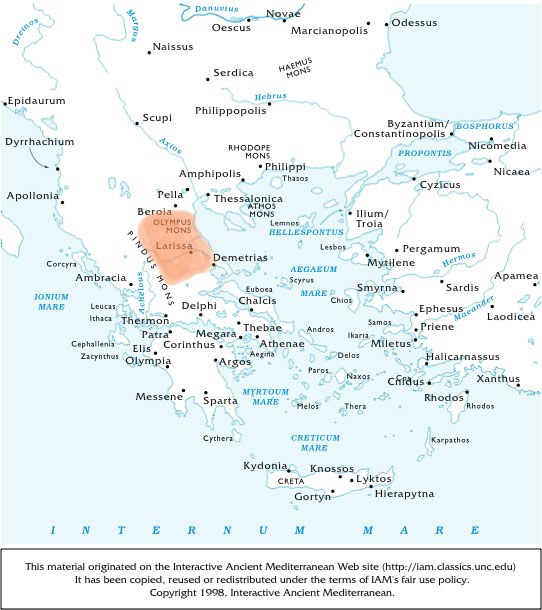The largest area of Greece. It was bounded on the north by the Cambunian Mountains, which separated it from Macedonia; on the west by Mount Pindus, which separated it from Epirus; on the east by the Aegaean Sea; and on the south by the Maliac Gulf and Mount Oeta, which separated it from Locris, Phocis, and Aetolia. Thessaly proper is a vast plain, [p. 1572] shut in on every side by mountain barriers, broken only at the northeastern corner by the valley and defile of Tempé, which separates Ossa from Olympus. This plain is drained by the river Peneus and its affluents, and is said to have been originally a vast lake, the waters of which were afterwards carried off through the vale of Tempé by some sudden convulsion which rent the rocks of this valley asunder. In addition to the plain already described, there were two other districts included under the general name of Thessaly: one called Magnesia, being a long, narrow strip of country extending along the coast of the Aegaean Sea from Tempé to the Pagasaean Gulf, and bounded on the west by Mounts Ossa and Olympus; and the other being a long, narrow vale at the extreme south of the country, lying between Mounts Othrys and Oeta, and drained by the river Spercheus.The Thessalians were a Thesprotian tribe, and, under the guidance of leaders who are said to have been descendants of Heracles, invaded the western part of the country, afterwards called Thessaliotis, whence they subsequently spread over the other parts of the country. For some time after the conquest, Thessaly was governed by kings of the race of Heracles; but the kingly power seems to have been abolished in early times, and the government in the separate cities became oligarchical, the power being chiefly in the hands of a few great families descended from the ancient kings. Of these, two of the most powerful were the Aleuadae and the Scopadae, the former of whom ruled at Larissa, and the latter at Cranon (or Crannon). At an early period the Thessalians were united into a confederate body.
Each of the four districts into which the country was divided probably regulated its affairs by some kind of provincial council; and in case of war a chief magistrate was elected, under the name of Tagus (Tagos), whose commands were obeyed by all the four districts. This confederacy, however, was not of much practical benefit to the Thessalian people, and appears to have been only used by the Thessalian nobles as a means of cementing and maintaining their power.
The Thessalians never became of much importance in Grecian history. In B.C. 344 Philip completely subjected Thessaly to Macedonia, by placing at the head of the four divisions of the country governors devoted to his interests. The victory of T. Flamininus at Cynoscephalae, in 197, again gave the Thessalians a semblance of independence under the protection of the Romans. (Harpers Dictionary of Classical Antiquities, 1898)
